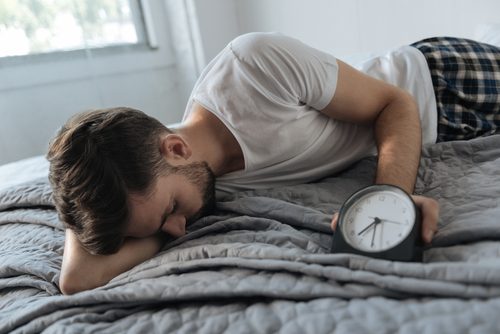Dealing with Duchenne and the Power of a Good Night’s Sleep

College is a busy time in my life. I can easily overbook my schedule and have little time to do homework. I’ve resisted the temptation to stay up late on many occasions. I know the power of sleep. Sleeping about nine hours a night gives me a chance to recover from the day and allow my muscles to rest. Prioritizing sleep above school has gotten me through life so far.
I developed good sleeping habits growing up. My parents retired early, and my bedtime routine followed suit. I kept up with the schedule when I started high school; I went to sleep around 10 p.m. every night and woke up at 7 a.m. College is variable, but I still get an average of nine hours. Class starts at 11 a.m. one day and 8 a.m. the next. My schedule is flexible.
And while nine hours may seem excessive, you may be surprised to learn that the National Sleep Foundation recommends eight to 10 hours a night for teenagers. The range for adults is seven to nine hours.
Sleep has additional importance for me because of Duchenne muscular dystrophy. When I get less than eight hours, I cannot function at full mental or physical capacity. Even the slightest weakness could lead to a fall. I’m confined to my wheelchair as soon as a falling pattern develops. I can still walk, and I want to maintain my independence for as long as possible.
Quantity and quality of sleep are significant. You can still miss out on quality sleep even if you get the recommended amount. I have had a few sleep studies done at my annual Duchenne clinic because with this disease, I am prone to respiratory issues during sleep. Following my last sleep study, the doctors determined that I had mild sleep apnea and should use a BiPAP machine that provides positive airway pressure to aid breathing at night.
I’m not perfect or consistent with using my BiPAP. However, I will be using it a lot more after researching sleep for this column. I have trouble falling asleep while wearing a mask on my face. I’ve tried a sleeker nasal mask to no avail; it’s uncomfortable, and the air shoots out of my mouth when I breathe.
I’ve pushed back on my parents when I now realize that they were right. They tell me I should force myself to get used to the mask. I know that it’s better for me to acclimate to it now rather than when it is essential. Learning is great, but I need to apply the knowledge I’ve acquired. I’ve donned the mask about 10 times this year, and I don’t think I’ve had a full night’s sleep while wearing it.
However, I warn other BiPAP users against following my example. I advise you to get used to sleeping with a BiPAP.
So, getting proper sleep is step one. I’m happier and smarter with nine hours of sleep. Step two is a mental challenge. I know I will get quality sleep with my BiPAP. By writing this, I’m holding myself accountable; guilt will force me to wear the mask tonight.
Scheduling sleep is like organizing anything else. But sleep is more important than homework, paying bills, or going to the movies. You heard it here first. I guarantee you that it’s possible to be productive while getting sufficient sleep. Put the hours in your day toward what counts. For me, that means fewer video games. Others will make different sacrifices.
My dad and I listen to “The Tim Ferriss Show” podcast. This self-helper extraordinaire has interviewed many successful people. Tim was asked on Quora: “It seems that high performance requires sleeping less. Do you think it is true?”
His response: “Looking at the 200-plus world-class performers I’ve interviewed, I can say this is untrue. Completely false. Many of them get 8–10 hours of sleep every night.”
Each person has varying sleep requirements. I need to rest more than the average person. Getting an extra hour or two of sleep has worked for me. I’ve had six hours and 11 hours — and nine feels right for me. Each of us must figure out our individual needs. Sleep has made life easier in my battle against Duchenne.
***
Note: Muscular Dystrophy News is strictly a news and information website about the disease. It does not provide medical advice, diagnosis or treatment. This content is not intended to be a substitute for professional medical advice, diagnosis, or treatment. Always seek the advice of your physician or another qualified health provider with any questions you may have regarding a medical condition. Never disregard professional medical advice or delay in seeking it because of something you have read on this website. The opinions expressed in this column are not those of Muscular Dystrophy News or its parent company, Bionews Services, and are intended to spark discussion about issues pertaining to muscular dystrophy.








Judy
I want a cure for my tonic dystrophy I’m 16 and have hope that science can change my life please help if there is any trials I can take part in.
With hope
Judy Akid